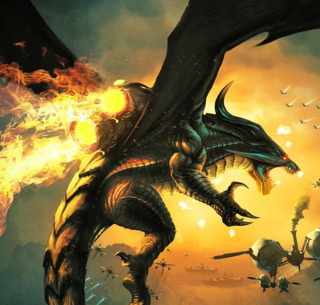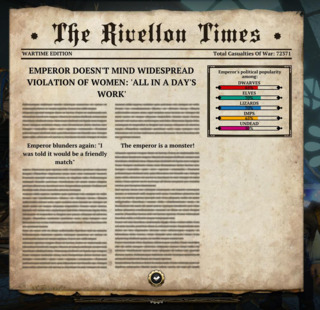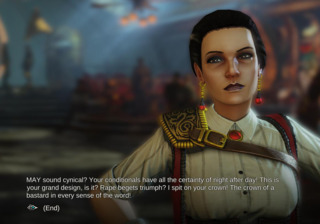The surprising intricacies of binary politics, or how I became the worst monster in history
By Draugen 12 Comments
(Warning: This text touches on some of the most loathsome things human beings can do to each other)

To the politically savvy, the following text might induce some eye rolls. Right after they've finished cursing my name for the monster this game made me in the end. And I say that it made me, with the knowledge firmly in hand that I did not in fact set out to become the most hateful of war criminals. Even as it was happening, I didn't mean to be the catalyst for the horrific consequences my maneuvering left in its wake.
So settle down, relax, have a drink, and let me regale you with the tale of how I inadvertently instituted a state sponsored war-time rape/breeding program.
Divinity: Dragon Commander is a peculiar little game. It is one third RTS, one third RISK clone and one third choice based RPG. You play the role of the Dragon Commander, half-dragon, and one part of a quartet of siblings, all potential heirs to the title of a dead emperor, all fighting a world-wide conflict to secure their birth-right. It is set in the fantasy land of Rivellon, predictably populated with humans, dwarves, elves, lizard people, imps and undead. It's a game that makes you think you know what it will throw at you. After a while though, you become aware that the game's fantasy setting is actually a very thin veneer, hiding behind it a game with very modern sensibilities, tackling very modern issues. And all the characters within it are less well-rounded individuals, and more avatars, standing in for the ideology they represent.

The undead people are the religious set. The elves are the environmentalists. The dwarves are capitalists, the lizards are socialists and the imps are technocrats. All of them play their roles within the political game, the RPG third of the game. In between the battles and strategizing of the RTS, you return to your flagship to face these hotbutton political issues, presented to you by the representatives of each of the aforementioned races. These issues can be easily recognized as plucked from present day discourse. It is merely given a fantasy tint, but at no point does the game try to hide the fact that you are taking a stand on very modern questions. Questions like immigration, legalized narcotics, religious rights, freedom of speech, socialized medicine, right to carry arms, etc. These are all issues the game presents to you, in a completely binary form. It is always a simple yes/no. And had I kept this in mind, I probably wouldn't have committed the atrocities I eventually did.
It is at this point your generals come in. Like the ambassadors, your four battlefield commanders represents a certain ideology or identity. Henry represents brute strength militarism, Scarlett represents youth and homosexuality, Edmund represents the old school gentlemanly officer, and Catherine represents feminism.
And it is her that my story revolves around. She is, quite frankly, a nasty piece of work. Whenever a matter regarding women's rights comes up in the political third, she is somehow involved, whether it concerns women's rights to vote, to equal pay or to breast feed in public. If you go against her, she will scold you with remarkable eloquence. If you side with her, she will sarcastically lambaste you for not instituting these changes sooner. Despite this, I found it difficult not to agree with her. She always presented her case very well, and I really wanted my rising empire to be tolerant and kind to women. And it was. Until Catherine returned from a surprise inspection at the front.
She cornered me in the bar, absolutely furious, telling me she had found a large section of our soldiers would subject the civilian population to unspeakable horrors, chief among them, raping women and girls. (Yes, despite its colourful look and light fantasy setting, the game goes incredibly dark at times.)

General Catherine had immediately had the worst offenders executed. She now wanted carte blanche to do the same to anyone who did something like it in the future, go aggressively after the perpetrators. I considered this, but eventually sided against it. I figured that the original set of executions had set an example, and that it wouldn't be a huge problem in the future. Naturally, Catherine wasn't happy, but she had no choice but to accept it. I should point out that morally, ideologically, I agreed with her. Someone who subjects defenseless victims to such barbarous acts deserve little mercy. Pragmatically though, I knew that any choice from the political game carries over to the strategic game. Mass executions would mean a loss to my recruitment pool, resulting in a weaker army. So I turned her down. Another round passes, and in the mean time, I suffer a devastating defeat in a major battle, putting me on the defensive.
She returns to me with barely contained anger, and starts laying into me. Apparently, and maybe in hindsight, predictably, my decision has had dire consequences. My leniency has led to the impression that the army's high command, while not outright condoning the hideous practice, are willing to turn a blind eye. So the problem is escalating. Catherine presents me with her new demand.
And again, this is where the fantasy veneer is overlaying the contemporary issue. She wants me a legalize hobweed, a kind of plant that will cause abortions, and make it available to the victims of my soldiers' crimes. And in replying to this request, I make myself history's greatest monster. The war isn't going well, I'm on the defensive, and I have my enemies on my borders. The war can drag out for a long time, and I figure that, as a leader in a desperate situation, I have to take advantage of this, and as unfortunate as the thing is, this is an opportunity to bolster my ranks with new soldiers in the long run.
Yup. Instead of being a human being, I did that.

And it only occurred to me later the scope and ramifications of what I'd done. I looked at the two binary choices, and figured what I did was perhaps overly pragmatic, but not monstrous. When in fact, looking at the practical outcome, it was something of the worst things a leader can possibly do to his people. I began a program of institutionalized abuse of the most abominable kind. And it was never my intention. I wasn't role playing some kind of evil despot, I wasn't setting out to see what the most horrible things the game would let me do was. I was simply acting in what I thought was my nation's best interest.
Is there a lesson to be learned from this? I don't know. Maybe it's that power is a corrupting agent, and that seeing everything from the top down makes you lose perspective of the individual fates, and not feel the impact of your own actions. It all becomes a number's game. Or maybe it's Divinity: Dragon Commander is just a game, completely lacking the ability to simulate the mechanics of ruling an empire. Either way, what is clear is that I should never be granted any kind of power. Because intentions be damned, it will end badly for someone.
